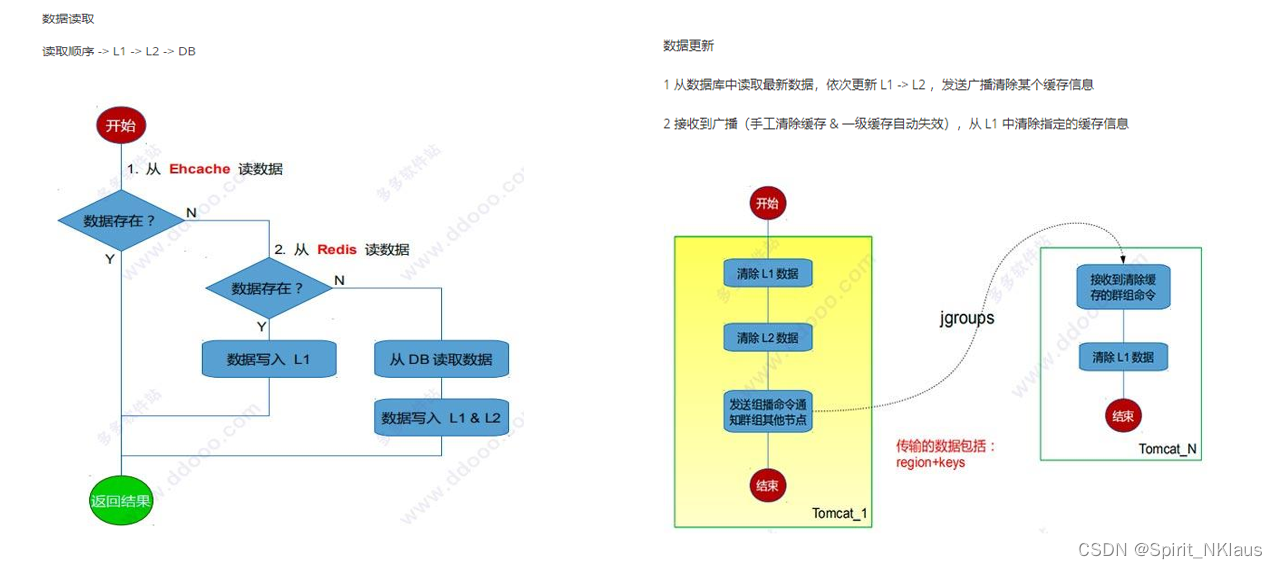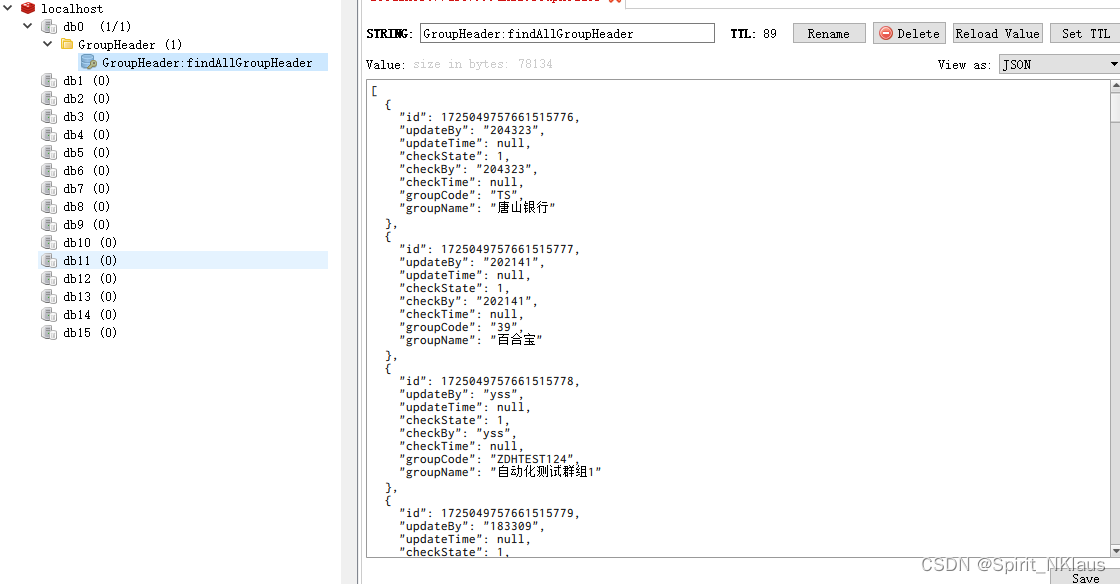两级缓存相比单纯使用远程缓存,具有什么优势呢?
本地缓存基于本地环境的内存,访问速度非常快,对于一些变更频率低、实时性要求低的数据,可以放在本地缓存中,提升访问速度
使用本地缓存能够减少和Redis类的远程缓存间的数据交互,减少网络I/O开销,降低这一过程中在网络通信上的耗时
但是在设计中,还是要考虑一些问题的,例如数据一致性问题。首先,两级缓存与数据库的数据要保持一致,一旦数据发生了修改,在修改数据库的同时,本地缓存、远程缓存应该同步更新。
如果是分布式环境下,一级缓存之间也会存在一致性问题,当一个节点下的本地缓存修改后,需要通知其他节点也刷新本地缓存中的数据,否则会出现读取到过期数据的情况,这一问题可以通过类似于Redis中的发布/订阅功能解决。
此外,缓存的过期时间、过期策略以及多线程访问的问题也都需要考虑进去,不过我们今天暂时先不考虑这些问题,简单的在代码中实现两级缓存的管理。

图片中一级缓存找的图是Ehcache,但实际项目中我使用的是caffeine做一级缓存,redis做二级缓存原理都是一样,先引入相关依赖
<dependency><groupId>org.springframework.boot</groupId><artifactId>spring-boot-starter-data-redis</artifactId></dependency><dependency><groupId>com.github.ben-manes.caffeine</groupId><artifactId>caffeine</artifactId><version>2.9.2</version></dependency><dependency><groupId>org.springframework.boot</groupId><artifactId>spring-boot-starter-cache</artifactId></dependency><dependency><groupId>org.apache.commons</groupId><artifactId>commons-pool2</artifactId><version>2.8.1</version></dependency>在yml中配置redis的相关信息
redis:host: localhostport: 6379password:timeout: 5000
# lettuce:
# pool:
# max-active: 8
# max-wait: -1ms
# max-idle: 8
# min-idle: 0注释的lettuce都是默认值,实际要调整放开注释自行调整即可
枚举类型枚举
public enum CacheType {/*** 存取*/FULL,/*** 只存*/PUT,/*** 删除*/DEL
}定义一个注解,用于添加在需要操作缓存的方法上,使用cacheName + key作为缓存的真正key,timeOut为可以设置的二级缓存Redis的过期时间,type是一个枚举类型的变量,表示操作缓存的类型
import com.yx.light.element.jpa.enums.CacheType;import java.lang.annotation.*;@Target(ElementType.METHOD)
@Retention(RetentionPolicy.RUNTIME)
@Documented
public @interface L2Cache {/*** 缓存名字* @return*/String cacheName();/*** 缓存key* @return*/String key() default ""; //支持springEl表达式/*** redis缓存超时时间* @return*/long timeOut() default 120;/*** 缓存类型* @return*/CacheType type() default CacheType.FULL;
}RedisTemplate配置类
import org.springframework.cache.annotation.CachingConfigurerSupport;
import org.springframework.cache.annotation.EnableCaching;
import org.springframework.context.annotation.Bean;
import org.springframework.context.annotation.Configuration;
import org.springframework.data.redis.connection.RedisConnectionFactory;
import org.springframework.data.redis.core.RedisTemplate;
import org.springframework.data.redis.serializer.Jackson2JsonRedisSerializer;
import org.springframework.data.redis.serializer.StringRedisSerializer;@Configuration
@EnableCaching
public class RedisConfig extends CachingConfigurerSupport {/*** 配置自定义redisTemplate** @return*/@BeanRedisTemplate<String, Object> redisTemplate(RedisConnectionFactory redisConnectionFactory) {RedisTemplate<String, Object> redisTemplate = new RedisTemplate<>();redisTemplate.setConnectionFactory(redisConnectionFactory);Jackson2JsonRedisSerializer jackson2JsonRedisSerializer = new Jackson2JsonRedisSerializer(Object.class);//设置值(value)的序列化采用Jackson2JsonRedisSerializer。redisTemplate.setValueSerializer(jackson2JsonRedisSerializer);//设置键(key)的序列化采用StringRedisSerializer。redisTemplate.setKeySerializer(new StringRedisSerializer());redisTemplate.setHashKeySerializer(new StringRedisSerializer());redisTemplate.afterPropertiesSet();return redisTemplate;}
}Caffeine配置类
import com.github.benmanes.caffeine.cache.Cache;
import com.github.benmanes.caffeine.cache.Caffeine;
import org.springframework.context.annotation.Bean;
import org.springframework.context.annotation.Configuration;import java.util.concurrent.TimeUnit;@Configuration
public class CaffeineConfig {@Beanpublic Cache<String, Object> caffeineCache() {return Caffeine.newBuilder().initialCapacity(128)//初始大小.maximumSize(1024)//最大数量.expireAfterWrite(60, TimeUnit.SECONDS)//过期时间.build();}
}El转换辅助工具类
import org.springframework.expression.EvaluationContext;
import org.springframework.expression.Expression;
import org.springframework.expression.ExpressionParser;
import org.springframework.expression.common.TemplateParserContext;
import org.springframework.expression.spel.standard.SpelExpressionParser;
import org.springframework.expression.spel.support.StandardEvaluationContext;import java.util.TreeMap;public class ElParserUtil {private ElParserUtil() {}public static String parse(String elString, TreeMap<String, Object> map) {elString = String.format("#{%s}", elString);//创建表达式解析器ExpressionParser parser = new SpelExpressionParser();//通过evaluationContext.setVariable可以在上下文中设定变量。EvaluationContext context = new StandardEvaluationContext();map.entrySet().forEach(entry ->context.setVariable(entry.getKey(), entry.getValue()));//解析表达式Expression expression = parser.parseExpression(elString, new TemplateParserContext());//使用Expression.getValue()获取表达式的值,这里传入了Evaluation上下文String value = expression.getValue(context, String.class);return value;}
}两级缓存切面,在切面中操作Cache来读写Caffeine的缓存,操作RedisTemplate读写Redis缓存。
import com.github.benmanes.caffeine.cache.Cache;
import com.yx.light.element.jpa.annotations.L2Cache;
import com.yx.light.element.jpa.enums.CacheType;
import com.yx.light.element.jpa.utils.ElParserUtil;
import lombok.AllArgsConstructor;
import lombok.extern.slf4j.Slf4j;
import org.aspectj.lang.ProceedingJoinPoint;
import org.aspectj.lang.annotation.Around;
import org.aspectj.lang.annotation.Aspect;
import org.aspectj.lang.annotation.Pointcut;
import org.aspectj.lang.reflect.MethodSignature;
import org.springframework.data.redis.core.RedisTemplate;
import org.springframework.stereotype.Component;
import org.springframework.util.StringUtils;import java.lang.reflect.Method;
import java.util.Objects;
import java.util.TreeMap;
import java.util.concurrent.TimeUnit;@Slf4j
@Component
@Aspect
@AllArgsConstructor
public class L2CacheAspect {private final Cache cache;private final RedisTemplate redisTemplate;@Pointcut("@annotation(com.yx.light.element.jpa.annotations.L2Cache)")public void cacheAspect() {}@Around("cacheAspect()")public Object doAround(ProceedingJoinPoint point) throws Throwable {MethodSignature signature = (MethodSignature) point.getSignature();Method method = signature.getMethod();//拼接解析springEl表达式的mapString[] paramNames = signature.getParameterNames();Object[] args = point.getArgs();TreeMap<String, Object> treeMap = new TreeMap<>();for (int i = 0; i < paramNames.length; i++) {treeMap.put(paramNames[i], args[i]);}L2Cache annotation = method.getAnnotation(L2Cache.class);String elResult = null;if (treeMap.size() == 0) {elResult = StringUtils.isEmpty(annotation.key()) ? method.getName() : annotation.key();} else {elResult = ElParserUtil.parse(annotation.key(), treeMap);}String realKey = annotation.cacheName() + ":" + elResult;//强制更新if (annotation.type() == CacheType.PUT) {Object object = point.proceed();if (Objects.isNull(object)) {log.info("方法执行完毕无返回值,无需更新缓存");return object;}redisTemplate.opsForValue().set(realKey, object, annotation.timeOut(), TimeUnit.SECONDS);cache.put(realKey, object);return object;} else if (annotation.type() == CacheType.DEL) {redisTemplate.delete(realKey);cache.invalidate(realKey);return point.proceed();}//读写,查询CaffeineObject caffeineCache = cache.getIfPresent(realKey);if (Objects.nonNull(caffeineCache)) {log.info("从caffeine中获取数据");return caffeineCache;}//查询RedisObject redisCache = redisTemplate.opsForValue().get(realKey);if (Objects.nonNull(redisCache)) {log.info("从redis中获取数据");cache.put(realKey, redisCache);return redisCache;}log.info("从数据库中获取数据");Object object = point.proceed();if (Objects.nonNull(object)) {//写入RedisredisTemplate.opsForValue().set(realKey, object, annotation.timeOut(), TimeUnit.SECONDS);//写入Caffeinecache.put(realKey, object);}return object;}
}改造service实现类的几个方法简单测试一下
@Override@L2Cache(cacheName = "GroupHeader", type = CacheType.FULL)public List<GroupHeader> findAllGroupHeader() {return groupHeaderRepository.findAll();}@Override@L2Cache(cacheName = "GroupHeader", key = "#groupHeader.groupCode", type = CacheType.PUT)public void editGroupHeader(GroupHeader groupHeader) {groupHeaderRepository.save(groupHeader);}@Override@L2Cache(cacheName = "GroupHeader", key = "#ids", type = CacheType.DEL)public void deleteGroupHeader(String ids) {String[] split = ids.split(",");for (String id : split) {groupHeaderRepository.deleteById(Long.parseLong(id));}}连续调用两次查询接口看日志打印效果和redis客户端的查询






![[word] 怎么删除文字底纹 #职场发展#其他](http://pic.xiahunao.cn/[word] 怎么删除文字底纹 #职场发展#其他)
)
镜像和生成容器,文章尾部有常用的linux命令)










)

